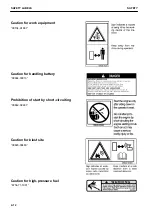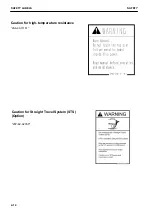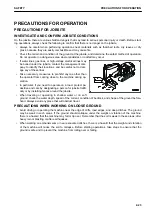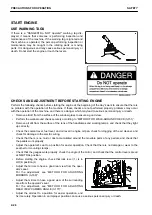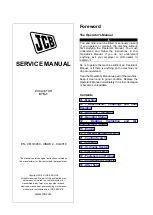
DO NOT GO CLOSE TO HIGH-VOLTAGE CABLES
Do not travel or operate the machine near electric cables. There is a hazard of electric shock, which may cause
serious personal injury or death. On jobsites where the machine may go close to electric cables, always observe
the following.
• Before starting work near electric cables, inform the local
power company of the work to be performed, and ask
them to take the necessary action.
• Even going close to high-voltage cables can cause electric
shock. Always maintain a safe distance (see the table) be-
tween the machine and the electric cable. Check with the
local power company about the voltage of cables and safe
operating procedure before starting operations.
• To prepare for any possible emergencies, wear rubber shoes and gloves. Lay a rubber sheet on the opera-
tor's seat, and be careful not to touch the chassis with any exposed part of your body.
• Use a signalman to give warning if the machine approaches too close to the electric cables.
• When performing operations near high voltage cables, prohibit anyone other than related persons to come
close to the machine during operation.
• If the machine should come too close or touch the electric cable, to prevent electric shock, the operator
should not leave the operator's compartment until it has been confirmed that the electricity has been shut
off. Also, prohibit any other persons to come close to the machine.
ENSURE GOOD VISIBILITY
Although this machine is equipped with mirrors and cameras to ensure good visibility, there are places that can-
not be seen from the operator's seat. Be careful when performing operation.
When driving the machine or performing operations in places with poor visibility, it is dangerous and may cause
serious personal injury or death because it is difficult to check for obstacles and condition of the jobsite. When
driving the machine or performing operations in places with poor visibility, always observe the following.
• Allocate a signalman for jobsite duty if there are areas where the visibility is poor.
• Only one signalman should give signals.
• When working in dark places, turn on the working lamp and headlamps installed to the machine, and set up
additional lighting in the work area if necessary.
• Stop operations if the visibility is poor because of mist, snow, rain, or dust.
• When checking the mirrors installed to the machine, remove all dirt and adjust the angle of the mirror to
ensure good visibility.
• Clean off any dirt from the lens of cameras installed to the machine, and make sure that the camera gives a
clear view.
PRECAUTIONS FOR OPERATION
SAFETY
2-24



